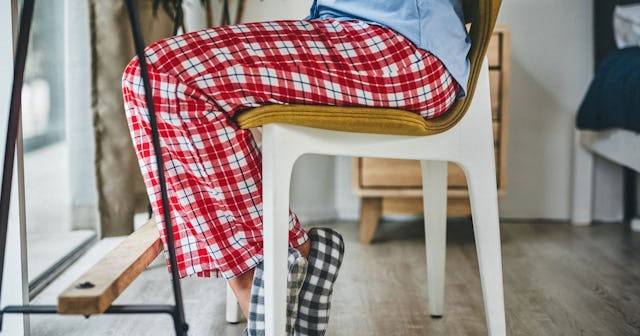How The Pandemic Could Be Harming Your Pelvic Floor

During my postpartum exam after my second child was born, I was told that I had a weakened pelvic floor and a rectal prolapse (when your rectum slips down from its normal position … ewwwwww, right?). My midwife suggested that I do Pilates or see a pelvic floor therapist.
Well, life with two young kids got the better of me, and I did neither of those things. I wasn’t experiencing any symptoms and I didn’t think it really mattered. Then, about five years later, things went haywire. I started to notice my prolapse, because it was causing deep rectal pressure and pain, especially during my period. But what really got to me is when I started to have pain during sex. Oh, hell no!
Long story short, I ended up learning everything I could about rectal prolapses and the pelvic floor. I started an exercise program that targeted these problems specifically, stuck to the routine religiously, and within a few months, my symptoms were better. Whoo-hoo!
One of the things I learned is that strengthening your pelvic floor and fixing your prolapses requires a holistic approach. Your pelvic floor—which is basically the muscles that hold your bladder, uterus, and rectum in place—can be affected by a whole bunch of stuff, and you need to keep your pelvic floor and everything around it strong and healthy in order to heal things like diastasis recti, weak pelvic floor, and pelvic prolapses.
For example, habits like straining when you poop can cause your pelvic floor to weaken. Heavy lifting and excessive coughing can make things worse. Oh, and certain exercises, like jumping or sit-ups, can cause harm.
It turns out, too, that some of the things we’ve been doing thanks to pandemic life are pretty bad for our pelvic floor (as if we needed something else to stress out!). According to The Washington Post, sitting for many hours at a computer is really bad for your pelvic floor, and so are anxiety and stress.
As The Post explains, sitting for extensive periods of time in front of a computer and just generally being more sedentary can shorten and tighten your pelvic floor muscles. Not only that, stress can cause you to tighten your whole body up, including your pelvic floor.
Both of these things together are bad for your pelvic floor health—and experts have told The Post that they are seeing increased cases of pelvic floor issues since the pandemic began.
“The combination of stress and then just sitting and not getting up to go to do those different activities throughout your workday definitely seem to have contributed to people’s symptoms,” Alicia Jeffrey-Thomas, pelvic floor physical therapist at Greater Boston Urology, tells The Post.
Thankfully, most of us aren’t completely locked down in our homes anymore, and are becoming somewhat more active. I wouldn’t say that pandemic stress is totally gone (hello, winter surge), but many of us are at least seeing the light at the end of the pandemic tunnel.
Even if you are sitting all day for work (that’s me!), there are things you can do to keep your pelvic floor healthy. Practicing good posture, changing positions, and taking lot of breaks to stretch and move can help, according to The Post.
When it comes to pelvic floor stuff, I think it’s important to understand that some of the things we think of as “normal,” especially those of us who have given birth, aren’t really normal at all. Signs of pelvic floor issues include leaking pee, constipation, pelvic pain or pressure, and even lower back pain. Many of us think that peeing when we sneeze or laugh is just part of being a mom or getting older, but this doesn’t have to be your reality
If you are experiencing signs of pelvic floor damage: a weakening of the area or prolapse, you should talk to your doctor or a pelvic floor therapist. You can also look into exercise programs and exercises that are safe for that part of your body.
And definitely consider what daily habits of yours might be contributing to your symptoms, including sitting for long periods of time and experiencing heightened stress.
Most of all, if you are having pelvic floor issues, and are wondering if working on them is worth it, or something you should invest your time doing, my advice is absolutely yes. I think many of us—especially busy moms and women—end up ignoring issues like this, and not making things like our health and wellbeing a priority.
But you can’t pour from an empty cup, and you deserve to live a life where you feel strong and able … and one where you don’t leak pee every time you sneeze or laugh.
This article was originally published on